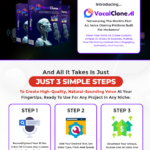In the vast digital landscape of affiliate marketing, where success stories abound, there’s one common thread that binds them all: consistency. It’s not about overnight riches or quick wins, but about the unwavering dedication to your craft. Think of it like a marathon runner; it’s not the initial burst of speed that determines the winner, but the steady pace maintained throughout the race.
In this blog, we’ll explore the transformative power of consistency in affiliate marketing. We’ll delve into practical strategies, share real-world examples, and provide actionable tips to help you achieve your goal of earning $10 daily. So, if you’re ready to embark on a journey towards financial freedom, buckle up and let’s dive in.
My Proven Way to Make $100-$200 Per Day With 0 Investment – Watch THIS FREE Video to START >>

Understanding Affiliate Marketing
Affiliate marketing is a performance-based business model where you promote other people’s products or services and earn a commission for each sale made through your unique affiliate link. It’s like being a digital salesperson, but without having to stock inventory or handle customer service.
How Affiliate Marketing Works
Here’s a simplified breakdown of how affiliate marketing works:
- You join an affiliate program: This that you can promote.
- You promote the products: You use various marketing channels, such as your website, blog, social media, or email list, to reach your target audience and promote the affiliate products.
- People click your affiliate link: When someone clicks on your affiliate link and makes a purchase, you earn a commission.
Types of Affiliate Marketing
There are three main types of affiliate marketing:
- Product affiliate marketing: This involves promoting physical or digital products, such as books, courses, software, or electronics.
- Service affiliate marketing: This involves promoting services, such as web hosting, online courses, or subscription boxes.
- Content affiliate marketing: This involves promoting content, such as blog posts, articles, or videos, that contain affiliate links.
Benefits of Affiliate Marketing
Affiliate marketing offers several advantages, including:
- Low startup costs: You don’t need a lot of capital to start an affiliate marketing business.
- Flexibility: You can work from anywhere and set your own schedule.
- Scalability: Your earnings can grow exponentially as your audience and promotions expand.
- Diverse earning potential: You can earn commissions from various products and services across different niches.
- Continuous learning: Affiliate marketing requires ongoing learning and adaptation to stay ahead of the curve.
My Proven Way to Make $100-$200 Per Day With 0 Investment – Watch THIS FREE Video to START >>
Setting Realistic Goals and Expectations
Setting clear and achievable goals is the cornerstone of success in affiliate marketing. Goals provide direction, motivation, and a sense of accomplishment. Without well-defined goals, it’s easy to get lost in the vast digital landscape and lose sight of your ultimate objectives.
The SMART Goal Framework
The SMART goal framework is a proven method for setting effective goals:
- Specific: Clearly define what you want to achieve. Instead of saying “I want to make money,” specify “I want to earn $100 per day from affiliate marketing.”
- Measurable: Quantify your goal so you can track your progress. Instead of saying “I want to increase my traffic,” specify “I want to increase my website traffic by 50% within the next month.”
- Achievable: Set goals that are challenging but realistic. Don’t set yourself up for failure by aiming too high.
- Relevant: Ensure your goals align with your overall affiliate marketing strategy and long-term objectives.
- Time-bound: Set a deadline for achieving your goal. This creates a sense of urgency and helps you stay focused.
Examples of SMART Goals
- Short-term goal: “I want to increase my email list by 200 subscribers within the next 30 days.”
- Long-term goal: “I want to achieve $1,000 in monthly affiliate earnings within the next six months.”
Avoiding Unrealistic Expectations
While it’s important to have ambitious goals, it’s equally important to avoid setting unrealistic expectations. Setting the bar too high can lead to disappointment, frustration, and even burnout. Remember, success in affiliate marketing is a gradual process that requires patience and perseverance.
By setting realistic goals and avoiding unrealistic expectations, you’ll increase your chances of achieving long-term success in affiliate marketing.
Choosing the Right Niche and Products
Selecting the right niche is a crucial step in affiliate marketing. Your niche should be something you’re passionate about and have some knowledge of. This will make it easier to create engaging content and build a loyal audience.
Here are some tips for finding a profitable niche:
- Identify your interests: What topics do you enjoy discussing? What are you curious about?
- Research popular niches: Look for niches with high search volume and demand. Use tools like Google Keyword Planner to identify popular keywords.
- Consider your expertise: Do you have any specific knowledge or skills that could be valuable to your target audience?
- Evaluate competition: Assess the level of competition in your chosen niche. A niche with moderate competition is often a good starting point.
Product Research
Once you’ve selected a niche, it’s time to find high-quality products or services to promote. Here are some tips for product research:
- Use affiliate marketplaces: Platforms like Amazon Associates, Commission Junction, and ShareASale offer a wide range of products to promote.
- Search for popular products: Look for products that are in high demand and have positive reviews.
- Consider your audience: Ensure the products you promote align with the interests and needs of your target audience.
- Evaluate product quality: Research the product’s features, benefits, and reputation to ensure it’s a worthwhile investment for your audience.
Affiliate Program Selection
Choosing the right affiliate program is essential for maximizing your earnings. Here are some factors to consider when selecting an affiliate program:
- Commission rates: Compare commission rates offered by different programs to find the most lucrative options.
- Cookie duration: The cookie duration determines how long a potential customer’s click on your affiliate link remains active. Longer cookie durations increase your chances of earning a commission.
- Program reputation: Research the reputation of the affiliate program and the company behind it. Look for programs with a track record of paying commissions on time.
- Support and resources: Consider the level of support and resources provided by the affiliate program. A good program will offer helpful tools and training materials.
My Proven Way to Make $100-$200 Per Day With 0 Investment – Watch THIS FREE Video to START >>
Building a Strong Online Presence
Your website or blog is your digital storefront where you showcase your affiliate products and build relationships with your audience. A well-designed website is essential for establishing credibility and attracting visitors.
Here are some key factors to consider when creating your website:
- User-friendly design: Ensure your website is easy to navigate and visually appealing.
- Mobile optimization: Make sure your website is optimized for mobile devices, as a significant portion of internet traffic comes from smartphones and tablets.
- Clear call to action: Use strong calls to action to guide visitors towards your affiliate links.
- Professional branding: Develop a consistent brand identity that reflects your personality and values.
Content Creation
High-quality, informative content is the lifeblood of your affiliate marketing business. It attracts visitors, establishes you as an authority in your niche, and builds trust with your audience.
Here are some tips for creating valuable content:
- Know your audience: Understand the needs, interests, and pain points of your target audience.
- Create original content: Avoid plagiarizing or copying content from other sources.
- Use keywords strategically: Incorporate relevant keywords into your content to improve your search engine rankings.
- Provide value: Offer your audience something valuable, such as helpful information, tips, or solutions to their problems.
- Consistency is key: Publish content regularly to keep your audience engaged.
SEO Optimization
Search engine optimization (SEO) is the process of improving your website’s visibility in search engine results. By optimizing your website for search engines, you can attract more organic traffic and increase your chances of making affiliate sales.
Here are some essential SEO techniques:
- Keyword research: Identify relevant keywords that your target audience is searching for.
- On-page optimization: Optimize your website’s content, titles, headings, and meta descriptions for your target keywords.
- Backlink building: Acquire high-quality backlinks from other reputable websites to improve your website’s authority.
- Technical SEO: Ensure your website is technically sound and free from errors that can hinder its performance.
- Mobile optimization: Make sure your website is optimized for mobile devices, as Google prioritizes mobile-friendly websites in search rankings.
Effective Promotion and Marketing
Content marketing is a powerful strategy for promoting your affiliate links. By creating valuable and engaging content, you can attract and retain your target audience while subtly promoting the products or services you’re affiliated with.
Here are some effective content marketing strategies:
- Blog posts: Write informative and engaging blog posts that address the needs and interests of your target audience.
- Social media: Share your content on social media platforms to reach a wider audience and engage with potential customers.
- Email marketing: Build an email list and send regular newsletters to nurture relationships with your subscribers and promote your affiliate products.
- Video content: Create videos that provide value to your audience and include affiliate links in the description or within the video itself.
Paid Advertising
Paid advertising platforms like Google Ads and social media ads can be a valuable tool for driving traffic to your website and promoting your affiliate links. However, it’s important to use paid advertising strategically to maximize your return on investment.
Here are some considerations for using paid advertising:
- Targeting: Use precise targeting options to reach your ideal audience.
- Budgeting: Set a realistic budget and track your performance to optimize your spending.
- A/B testing: Experiment with different ad variations to determine what works best.
- Tracking: Use tracking tools to measure the effectiveness of your paid advertising campaigns.
Building Relationships
Building relationships with your audience and other online influencers is essential for long-term success in affiliate marketing. By fostering connections, you can increase brand loyalty, generate referrals, and gain valuable insights.
Here are some tips for building relationships:
- Engage with your audience: Respond to comments, messages, and questions from your audience.
- Collaborate with other influencers: Partner with other influencers in your niche to cross-promote each other’s content.
- Join online communities: Participate in relevant online forums and communities to network with other professionals.
- Provide value: Offer your audience valuable content and assistance to build trust and loyalty.
My Proven Way to Make $100-$200 Per Day With 0 Investment – Watch THIS FREE Video to START >>
Conclusion
In conclusion, achieving $10 daily in affiliate marketing is not just a dream; it’s a tangible goal that can be achieved through consistent effort and strategic planning. By understanding the fundamentals of affiliate marketing, setting realistic goals, choosing the right niche and products, building a strong online presence, and effectively promoting your affiliate links, you can create a sustainable and profitable affiliate marketing business.
Remember, success in affiliate marketing is a journey, not a destination. It requires patience, perseverance, and a willingness to learn and adapt. By staying committed to your goals and continuously improving your skills, you can unlock the full potential of affiliate marketing and achieve financial freedom.









